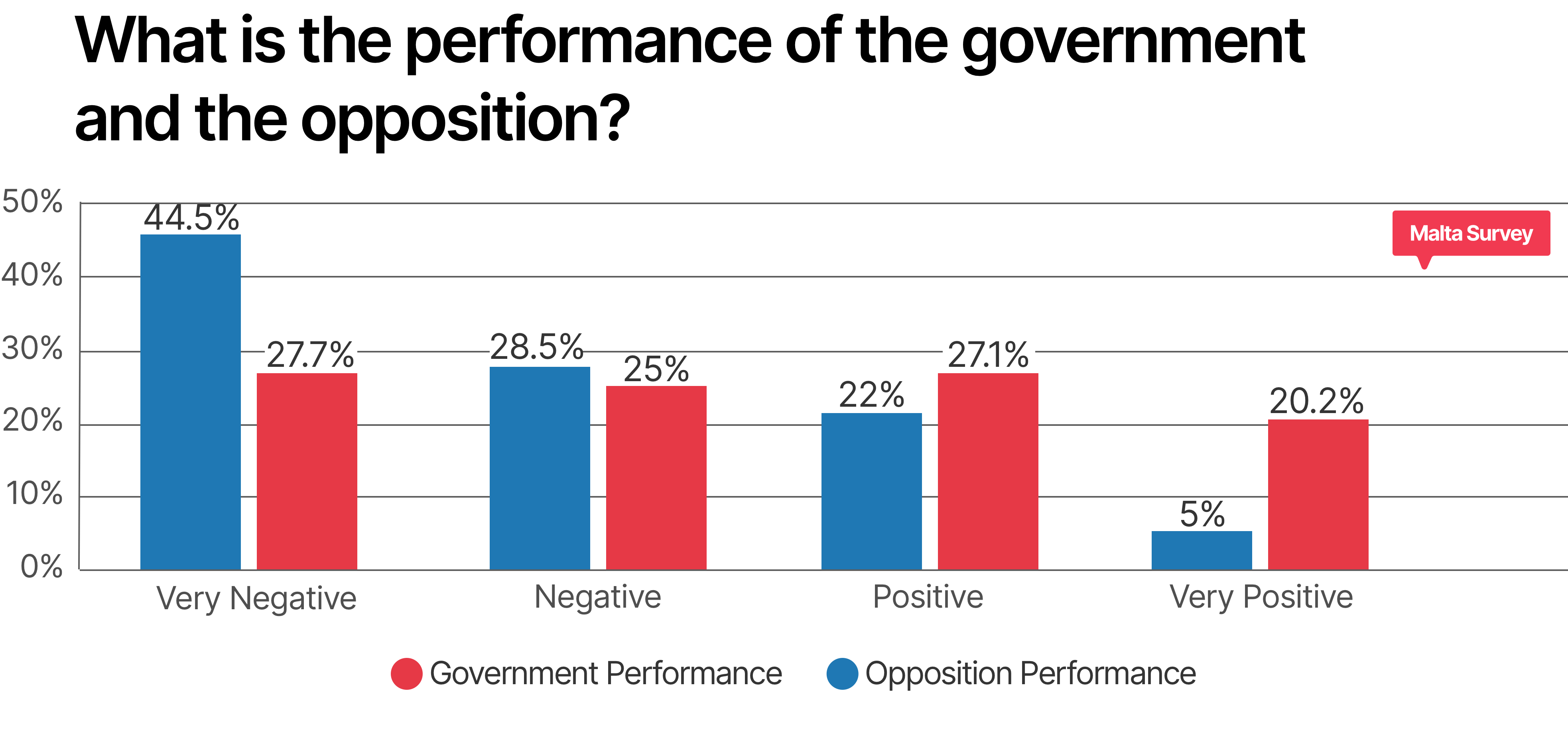European Parliament Elections - April 2024

Article byIDEA Research TeamPublished on Sun Apr 28 202414 minute read
Executive Summary
In the build-up for the European Parliament Elections happening in June 2024, Malta Survey carried out research through its online polling mechanism to identify the Maltese public’s sentiment and voting intentions during April 2024. The survey shows that while the PL is ahead of the PN by 13.4%, the final outcome of who will be elected is still uncertain. Notwithstanding the difference in party sentiment, the inheritance system adopted in Malta could also lead to a situation where both major parties will have an equal number of representatives in the European Parliament.
It is overtly clear that Roberta Metsola for the PN and Alex Agius Saliba for the PL are well ahead of other candidates from the political spectrum. The survey sample reinforces other surveys outlining higher popularity by Prime Minister Robert Abela (44.7%) than the Leader of the Opposition Bernard Grech (23.1%). The leader of ADPD Sandra Gauci enjoys 6.1% popularity.
Survey Methodology
This online survey was carried out between the 11th and 17th of April 2024. The survey was hosted on Malta Survey’s website – www.maltasurvey.com. Notice of its release was given through digital advertisements on social media platforms. No direct targeting or use of any pre-known datasets was done, thus protecting any identification of the sample’s participants. Each submission was verified through a series of automated checks and guards to prevent duplicate responses and ensure the legitimacy of the data. Participants had the option to carry out the survey either in Maltese or English and effort was made to ensure that all questions were neutral and non-leading. All submissions were gathered through Malta Survey’s platform and anonymity of the sample base was ensured. Analysis was done using data science tools.
Sampling and weighting
Sampling was carried out using stratified methods to mirror the demographic composition of Maltaʼs electorate, including age, gender, geographic location and education. Following sampling completion, statistical post-stratification weighting was applied to adjust for any discrepancies between the sample and the general population, ensuring that the results accurately reflect the views of the electorate as closely as possible.
Data Security & Privacy
Malta Survey adheres to strict protocols to protect the confidentiality and integrity of survey responses. All data transmissions are encrypted and no personal information is stored in the surveyʼs dataset.
Limitations & Disclaimer
Whilst Malta Surveyʼs digital polling methodology is designed to minimise errors and biases, it is important to acknowledge potential limitations. The reliance on digital technology means that any individuals without internet access may be potentially underrepresented. Despite efforts to ensure a representative sample, the self-selecting and fully voluntary nature of the respondents could introduce some level of response bias. However, like all survey methods, it is subject to certain inherent limitations that are diligently mitigated through the design and execution of the polling process.
Margin of Error
As of April 11 2022, Malta’s population of people aged 16 years and over stood at 447,456. With a sample size of 1,618, the findings mentioned below have a margin of error of 2.48% at a 95% confidence level. Specific sub-divisions by demographics and/or specific cohorts will have larger margins of error due to the smaller size of the sample portion considered.
Findings
Demographic Analysis of the Sample Population
The sample consists of 1,618 participants composed of 42% males and 58% females with the below distribution of age groups. This, coupled with the distribution of regions shows that the sample has a similar representation of the population of the Maltese islands.


The income distribution shows how this sample coincides with previously exhibited average income figures. It is important to note that just under 20% of the sample reserved the right to disclose their income bracket information which reflects a potential unconfirmed shift of the income distribution.

The online survey had the following research questions:
- What are the voting intentions of the upcoming European Parliament Election?
- What is the trust amongst the major party leaders?
- What is the public’s perception of the EU’s importance to the nation?
- What is the public’s perception of the performance of the Government and the opposition?
Our sample's voting intentions
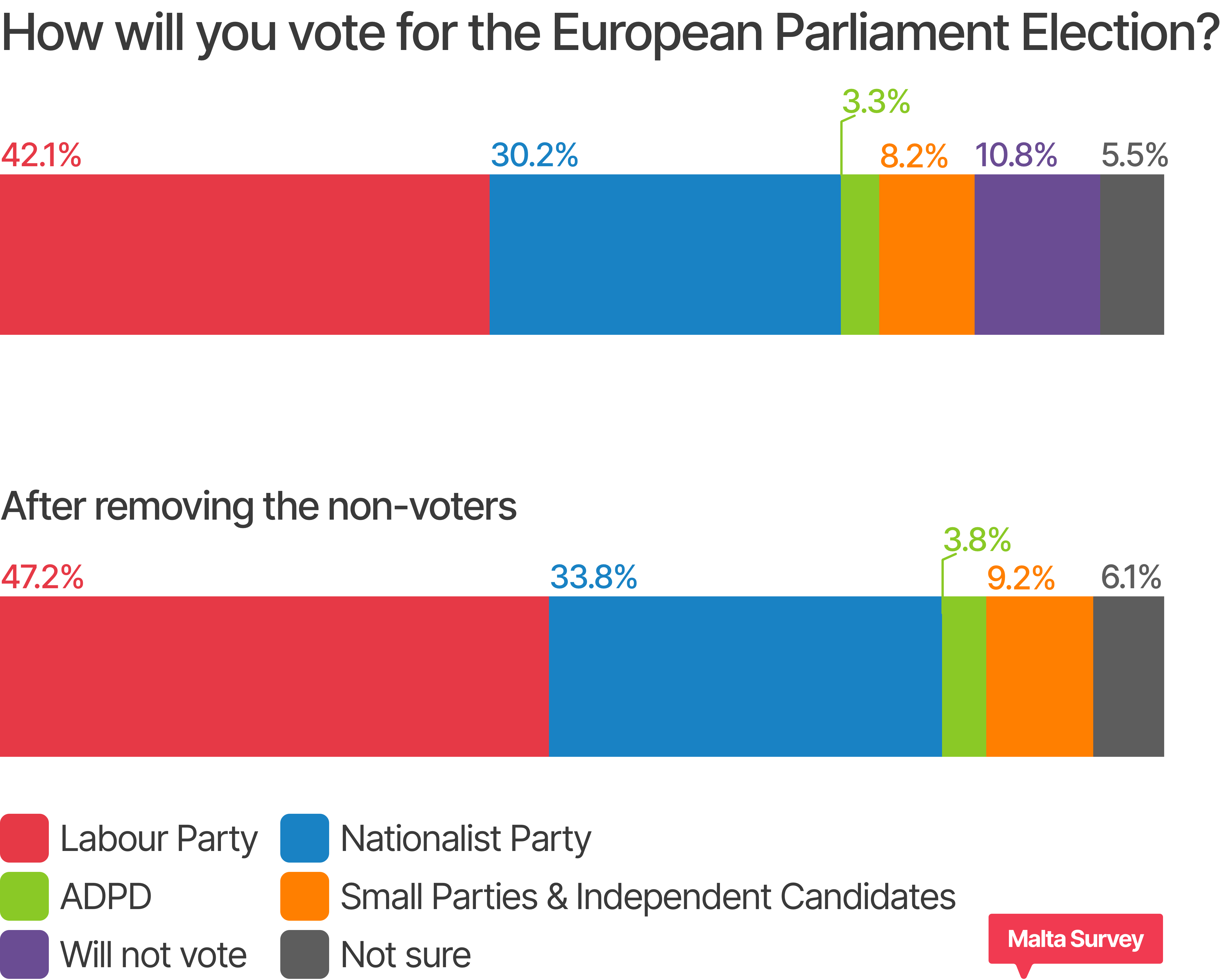
The first observation is the relatively high perceived turnout of this sample compared to other surveys being carried out in Malta from time to time. The nature of online surveys attracts people who are more likely to vote than other surveys. Research shows that online surveys generally attract higher interest amongst those who would go to polls on election day due to them being of a voluntary and opt-in manner.
After removing the non-voters, a total of 47.2% of the sample has opted to vote for the Labour Party, 33.8% for the Nationalist Party, 3.8% for ADPD, 9.2% have their vote cast for a small party or an independent candidate whilst 6.1% of the sample is still undecided. For the purpose of this analysis, the undecided voters have been kept as such and were not re-sorted into the most likely estimation of their vote.

According to the sample, whilst the Labour Party is still losing a significant portion of its 2022 voters to non-voters (at 12.8%), this loss of voters has shrunk since our 2023 poll which stood at 15.9% loss of voters to non-voters. A total of 74.2% of people who voted for the Labour Party in 2022 will retain their preferences for the upcoming EP Elections, which shows a gain in momentum since our 2023 poll where only 67.9% of the 2022 Labour Party voters said they would still vote for the Labour Party.
The Nationalist Party’s retention rate is 79.5% which shows no shift since our 2023 poll where the retention rate was 79.3%. A total of 4.8% of 2022 Nationalist Party voters in the sample stated that they would be voting for the Labour Party in upcoming EP elections. This shows an increase of 4% in loss to Labour Party voters since our 2023 poll where 0.8% of PN voters said they would be voting for the Labour Party.
The combination of these two retention figures shows a Labour Party that is regaining its momentum of retaining its voters from the last general elections in 2022.
Assessing the Candidate preference
The participants in the sample were asked to rank their top 3 candidates who had shown their intention to run in these elections prior to starting data collection. Others who had not presented their intention to run for elections were not included since this would skew the results unnecessarily. The table below depicts the results of these preferences.
This survey gave participants the option to rate the first three candidates, knowing that six candidates would be elected to the European Parliament. Malta’s single transferable vote system allows candidates to inherit votes from elected candidates. For clarity purposes, participants stating that they will not vote have been omitted while participants declaring they are yet to decide have been included since they still opted to give their preference for candidates.
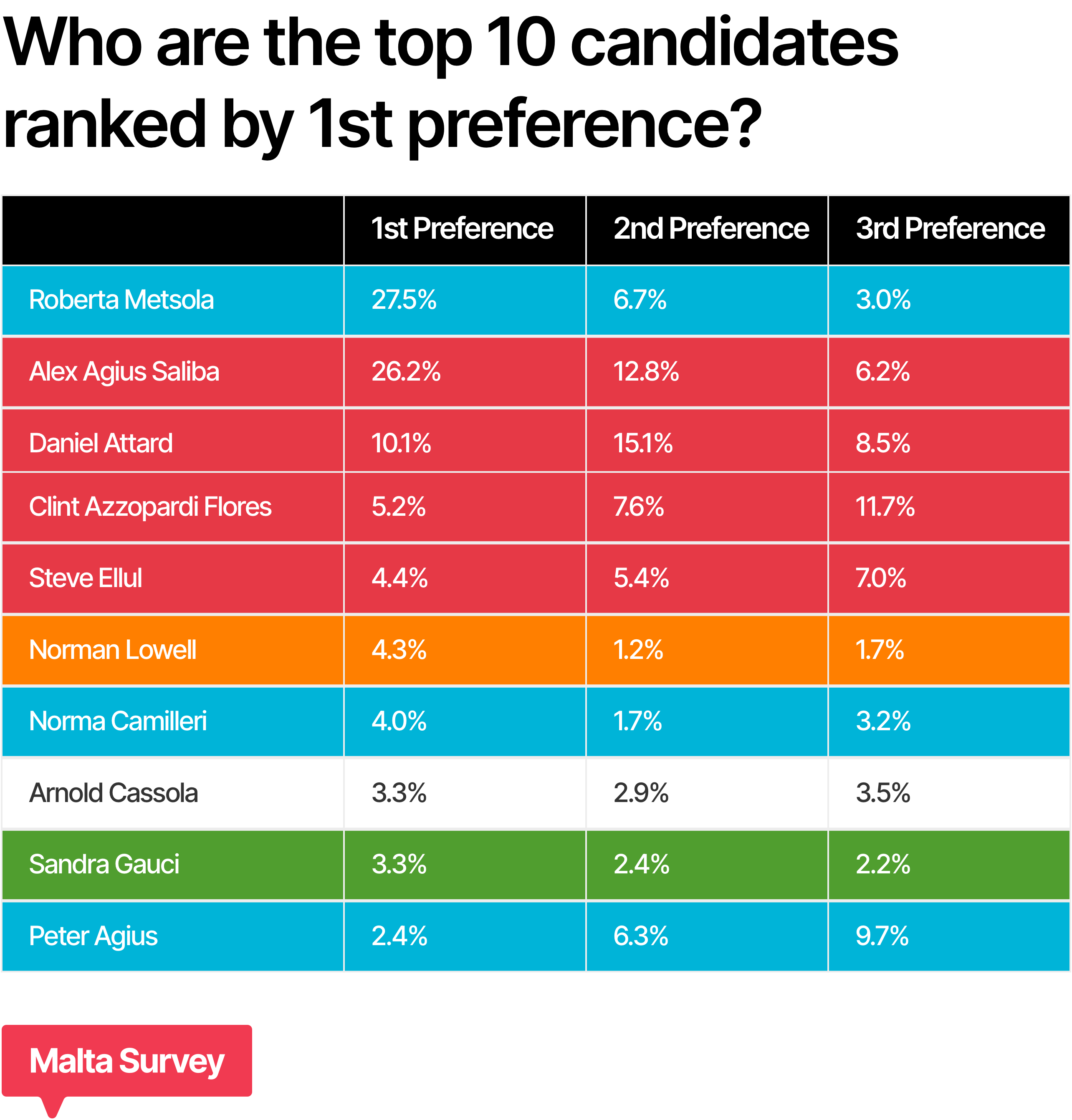
Amongst participants in this sample, the candidates with the strong showing of first preference are Roberta Metsola for the Nationalist Party at 27.5% of the sample and Alex Agius Saliba for the Labour Party at 26.2% of the sample.
Looking into the preferences of the first 10 candidates, one also finds three other candidates from the PL, namely Daniel Attard with 10.1%, Clint Azzopardi Flores with 5.2% and Steve Ellul with 4.4% as well as two other PN candidates namely Norma Camilleri with 4.0% and Peter Agius with 2.4%. Nevertheless, this does not imply that these candidates from both parties will be elected on their respective party ticket unless they inherit votes from candidates elected on the first count.
Not surprisingly, the list of the first 10 most popular candidates by first preference also features Norman Lowell from Imperium Europa with 4.3%; ADPD Leader Sandra Gauci with 3.3% and one independent candidate Arnold Cassola at 3.3%. It is imperative to reiterate that these results do not in any way imply that these will be elected unless they inherit a substantial number of votes after the first and second count. Reaching such a high number of votes may be unlikely for some mentioned here.
Who will inherit the votes of the elected candidates?
A novelty of this survey was to find out patterns of how votes could be inherited, particularly from those candidates who are perceived to be the most popular among the electorate. Having two candidates who emerged as being the most popular candidates, we investigated the second and third preferences as the diagram below clearly depicts.

Who will inherit Roberta Metsola's 2nd preference?
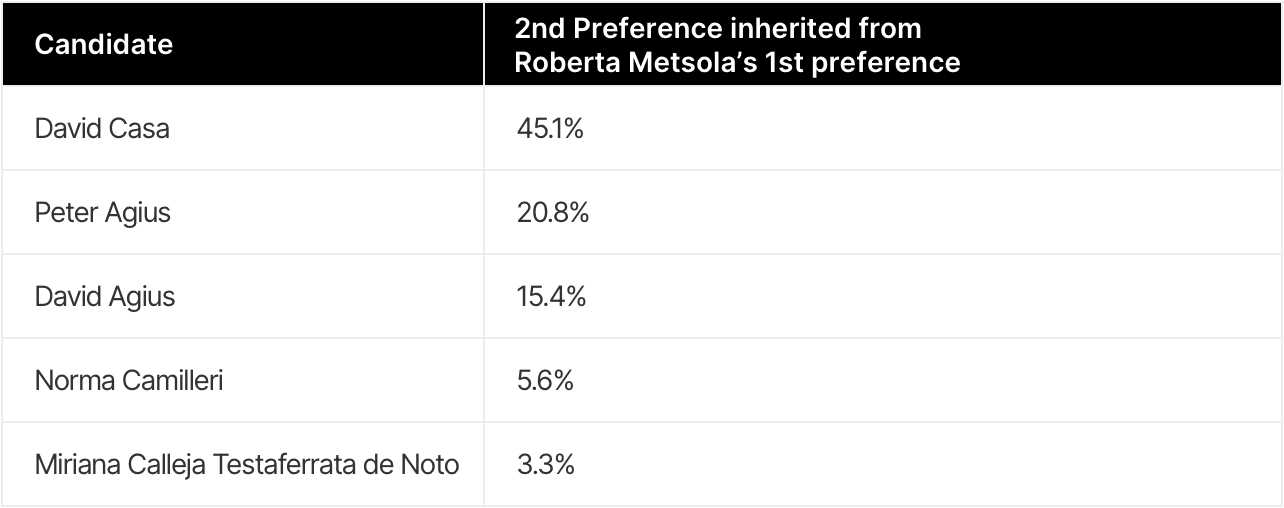
The sample shows that over 45% of Roberta Metsola’s second preference will go to David Casa. Although David Casa was not amongst the top ten candidates based on 1st preferences, his total second preference was second highest with 13.1%. The other second preference votes of Roberta Metsola will go to Peter Agius with 20.8% (who had 6.3% second preference across the sample) and David Agius with 15.4% (who had 6% second preference across the sample).
Who will inherit Alex Agius Saliba's 2nd preference?
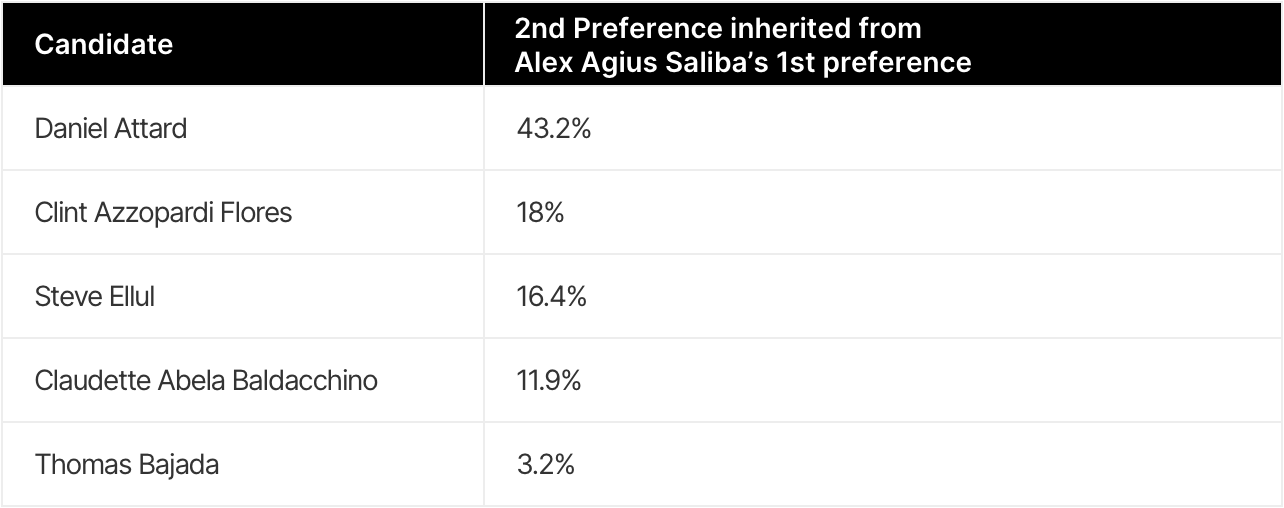
Daniel Attard inherits 43.2% of the 2nd preference from Alex Agius Saliba’s 1st preference in the sample, whilst Clint Azzopardi Flores inherits 18% and Steve Ellul inherits 16.4%. According to our sample, the fate of the remaining candidates in the list namely Claudette Abela Baldacchino who has 4.6% sample-wide 2nd preference and Thomas Bajada, who has 1.7% of the sample-wide 2nd preference will probably not be enough to remain in the race.
In line with the survey results, in view that David Casa and Daniel Attard will both inherit a significant portion of second preferences from Roberta Metsola and Alex Agius Saliba’s first preferences respectively, we delved into how the third preferences from Casa and Attard are allocated in this sample, assuming that both Casa and Attard will have reached a quota by this point.
Who will inherit David Casa's 3rd preference?

Amongst this sample, Peter Agius inherits 46.8% of the third preference from those participants giving their 2nd preference to David Casa, whilst David Agius inherits 26.1%.
Who will inherit Daniel Attard's 3rd preference?

Amongst this sample, Clint Azzopardi Flores inherits 31.3% of the third preference from those participants giving their 2nd preference to Daniel Attard whilst Steve Ellul inherits 20.7% and Marija Sara Vella Gafa’ inherits 11.5%.
Our sample's trust amongst party leaders
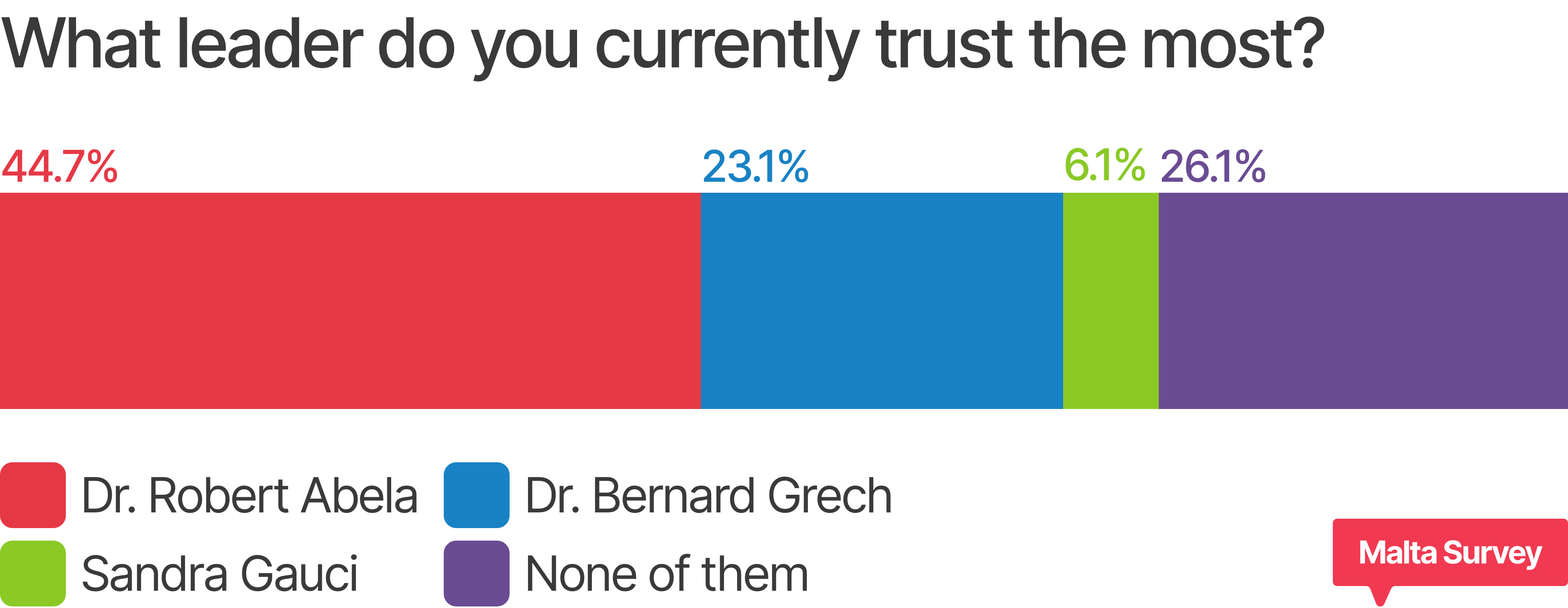
Dr. Robert Abela is currently firmly in the lead of this trust poll with 44.7%, followed by the portion of the sample who trust no particular leader at 26.1%. Dr. Bernard Grech occupies 23.1% of the trust whilst Sandra Gauci occupies 6.1%. It is quite critical to point that just over 26% of the sample respondents did not show any trust in any political leader.
Our sample's thoughts on the EU
When asked about their perception of how the EU impacts Malta from a negative to a positive sentiment, our sample has a clear affirmation that the EU positively impacts Malta with 35.9% answering “Positively” and 16.6% answering “Very Positively”. 29% of the sample have a neutral stance on the matter followed by 13.6% and 4.9% of the sample who think the EU has a “Negative” and “Very Negative” impact respectively.

When queried about the relative importance of the EP Elections when compared to the General Elections, 51.2% of the sample found an equal importance between the two elections, followed by 43.4% who found the European Parliament elections less important than the General Elections. Only 5.4% think that the upcoming elections are more important than the Maltese General Elections.
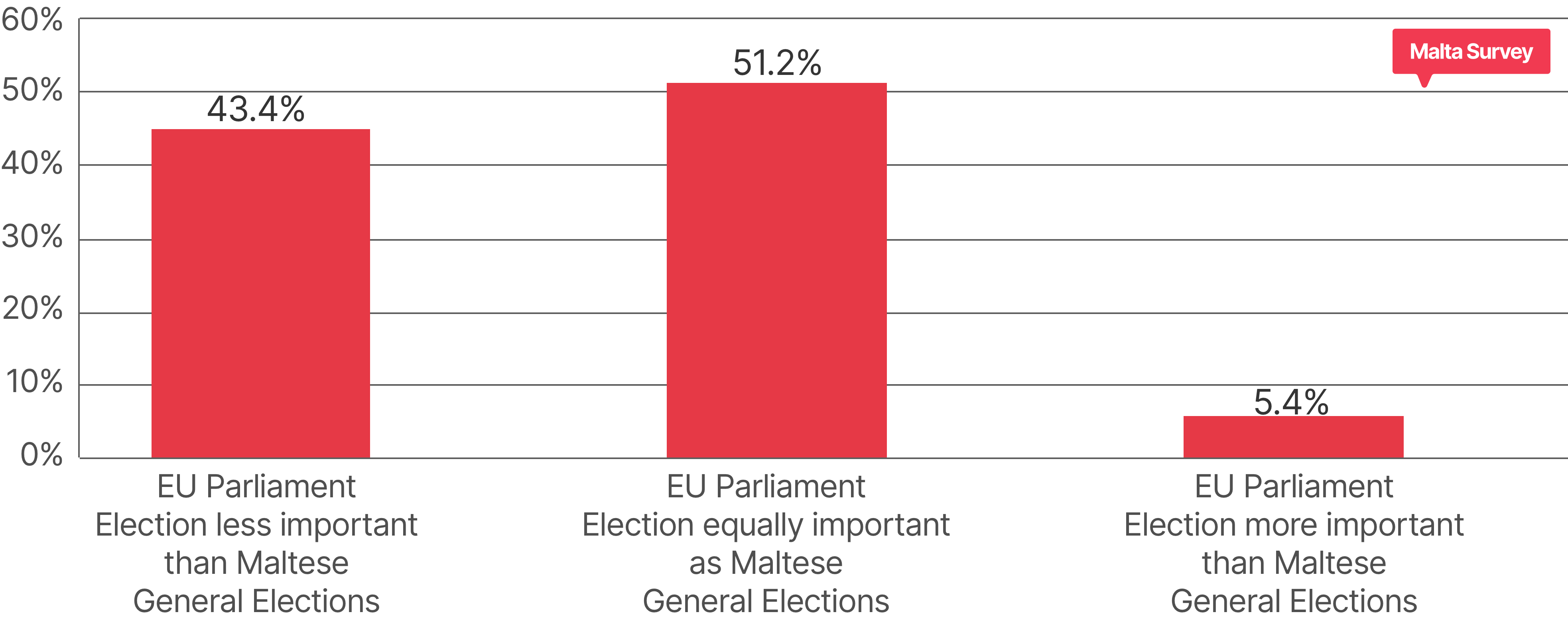
Our sample's thoughts on the performance of the Government and the Opposition
There is a shared sentiment of the sample’s rating of the government’s performance across all four options whilst there is a majority sentiment stating a very negative performance of the current opposition. These results are generally extrapolated on the overall voting sentiment as expressed throughout this survey. In fact, while the general rating of Government is almost evenly spread, the PN in opposition seems to be highly criticised for its performance and therefore has not made any inroads over these months and years.
